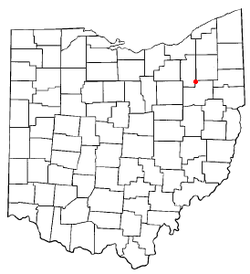Uniontown, Ohio
| Uniontown, Ohio | |
|---|---|
| CDP | |
 | |
 | |
| Coordinates: 40°58′35″N 81°24′26″W / 40.97639°N 81.40722°WCoordinates: 40°58′35″N 81°24′26″W / 40.97639°N 81.40722°W | |
| Country | United States |
| State | Ohio |
| County | Stark |
| Area | |
| • Total | 2.5 sq mi (6.5 km2) |
| • Land | 2.5 sq mi (6.5 km2) |
| • Water | 0.0 sq mi (0.1 km2) |
| Elevation[1] | 1,119 ft (341 m) |
| Population (2000) | |
| • Total | 2,802 |
| • Density | 1,122.5/sq mi (433.4/km2) |
| Time zone | Eastern (EST) (UTC-5) |
| • Summer (DST) | EDT (UTC-4) |
| ZIP code | 44685 |
| Area code(s) | 330 |
| FIPS code | 39-78736[2] |
| GNIS feature ID | 1065407[1] |
Uniontown is a census-designated place (CDP) in Stark County, Ohio, United States. The population was 2,802 at the 2000 census. Uniontown was named #69 on CNN Money's "Best Places to Live 2005" list.
Uniontown is part of the Canton–Massillon Metropolitan Statistical Area.
History
In 1833, Uniontown contained one church, two stores, one tavern, one school, one tannery, one physician, one clergyman, and 35 dwelling houses.[3]
Geography
Uniontown is located at 40°58′35″N 81°24′26″W / 40.97639°N 81.40722°W,[4] along the Tuscarawas River.[5]
According to the United States Census Bureau, the CDP has a total area of 2.5 square miles (6.5 km2), of which, 2.5 square miles (6.5 km2) of it is land and 0.04 square miles (0.10 km2) of it (0.79%) is water.
It is the location of the IEL Superfund site.
Demographics
As of the census[2] of 2000, there were 2,802 people, 1,141 households, and 861 families residing in the CDP. The population density was 1,122.5 people per square mile (432.7/km²). There were 1,171 housing units at an average density of 469.1/sq mi (180.9/km²). The racial makeup of the CDP was 98.14% White, 0.32% African American, 0.14% Native American, 0.54% Asian, 0.14% from other races, and 0.71% from two or more races. Hispanic or Latino of any race were 0.50% of the population.
There were 1,141 households out of which 26.2% had children under the age of 18 living with them, 65.7% were married couples living together, 7.4% had a female householder with no husband present, and 24.5% were non-families. 21.5% of all households were made up of individuals and 10.2% had someone living alone who was 65 years of age or older. The average household size was 2.46 and the average family size was 2.86.
In the CDP the population was spread out with 20.9% under the age of 18, 5.9% from 18 to 24, 24.6% from 25 to 44, 30.3% from 45 to 64, and 18.3% who were 65 years of age or older. The median age was 44 years. For every 100 females there were 90.4 males. For every 100 females age 18 and over, there were 88.5 males.
The median income for a household in the CDP was $47,206, and the median income for a family was $60,510. Males had a median income of $45,212 versus $28,625 for females. The per capita income for the CDP was $23,108. About 0.8% of families and 2.7% of the population were below the poverty line, including none of those under age 18 and 4.2% of those age 65 or over.
References
- ↑ 1.0 1.1 "US Board on Geographic Names". United States Geological Survey. 2007-10-25. Retrieved 2008-01-31.
- ↑ 2.0 2.1 "American FactFinder". United States Census Bureau. Retrieved 2008-01-31.
- ↑ Kilbourn, John (1833). The Ohio Gazetteer, or, a Topographical Dictionary. Scott and Wright. p. 455. Retrieved 12 December 2013.
- ↑ "US Gazetteer files: 2010, 2000, and 1990". United States Census Bureau. 2011-02-12. Retrieved 2011-04-23.
- ↑ DeLorme (1991). Ohio Atlas & Gazetteer. Yarmouth, Maine: DeLorme. ISBN 0-89933-233-1.
| ||||||||||||||||||||||||||
